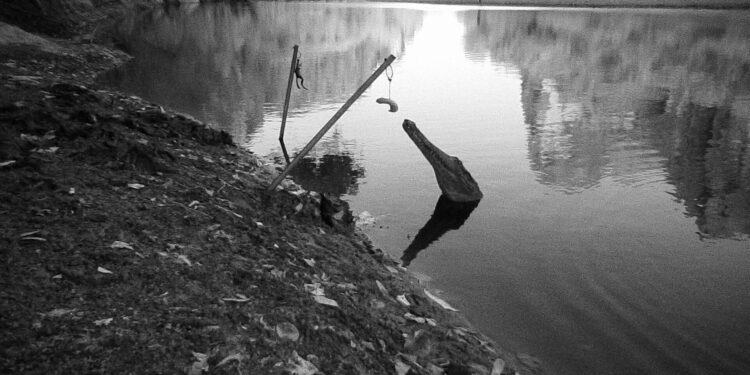A freshwater crocodile eats a rigged cane toad bait. Credit: Georgia Ward-Fear
Scientists from Macquarie University, working with Bunuba Aboriginal rangers and the Western Australian Department of Biodiversity, Conservation and Attractions (DBCA), have tested a new method to protect freshwater crocodiles from the deadly invasive cane toads spreading across northern Australia.
Freshwater crocodiles (Crocodylus johnstoni) are culturally significant animals and feature in the dreaming stories of the region’s traditional owners. The loss of these predators also disrupts the delicate balance of local ecosystems.
The group’s research, published in Proceedings of the Royal Society B On August 14, he presented a method for dramatically reducing mortality rates of freshwater crocodiles in areas where cane toads first invade, by teaching crocodiles to associate cane toads with food poisoning.
Lead author Dr Georgia Ward-Fear from Macquarie University’s School of Natural Sciences and co-author Professor Rick Shine documented the successful trial of a behavioural ecology method called conditioned taste aversion (CTA).
Bunuba Ranger Coordinator Paul Bin Busu and Rangers Kristen Andrews and Karl Bin Busu reported noticeable changes in crocodile behaviour during the program.
Following the success of the conservation intervention, Sara McAllister of the DBCA’s State Cane Toad Program can plan future interventions in areas with similar ecology.
Path of Destruction
Since cane toads were imported from South America in the 1930s, they have left a trail of native animal kills across northern Australia, wiping out local predatory species such as monitor lizards, snakes and freshwater crocodiles.
These animals are important foods for traditional owners and play a vital role in their environment, but they have no innate defences against venomous toads.
“The loss of freshwater crocodiles to cane toads means that the bottom feeders in our rivers will eat all the baitfish such as judembah (cherrabin, a large freshwater shrimp) and lardy (bony bream, an estuarine fish), leaving no fish for the barramundi and stingray to eat,” says ranger coordinator Paul Bin Busu.
The study was conducted mainly from May to October, the dry season in tropical northern Australia, when river systems can be reduced to a series of isolated pools, supporting far fewer of the shrimp, fish and amphibians that make up a freshwater crocodile’s normal aquatic diet, but higher densities of crocodiles.
“Freshwater crocodiles can be seriously impacted by their waterways drying up at the end of the dry season,” says Dr Ward-Fear. “They end up congregating in large numbers with very little food, and when the toads start using these water bodies to rehydrate, the two come into contact and we see large numbers of crocodile deaths within a matter of months.”
How they did it
Between 2019 and 2022, Dr Ward-Fear and Professor Shine worked with local rangers and DBCA staff to deploy tampered cane toad carcasses across four major gorge systems in the Kimberley region of north-western Australia.
Bunuba and DBCA collected hundreds of cane toads, removed the venomous parts and injected the toads’ bodies with enough of a nausea-inducing chemical that freshwater crocodiles eating the bait would temporarily feel sick (but not die).
Control chicken meat baits, without nausea-inducing additives, were used to monitor the effectiveness of taste aversion conditioned training.
“Being part of the field program and doing the work has been really good,” says Paul Bin Busu, whose team of rangers set up hundreds of bait stations along the river banks, using canoes to hang and replace fresh bait and monitor the crocodiles’ reactions.
Getting results
“The first three days, we noticed that the crocodiles were taking the cane toads and then leaving. Then we noticed that they were smelling the cane toad before eating it, and on the last day, we noticed that it was mostly the chicken necks that were being eaten,” he said.
Using nighttime ‘spotlight’ surveys and remotely triggered wildlife cameras to monitor crocodile and toad numbers, the team found that areas where taste aversion trials took place had significantly reduced crocodile mortality rates compared with unbaited control sites.
“Our baiting completely prevented deaths in areas where cane toads were arriving and reduced deaths by 95% in areas where cane toads had been present for a few years. These effects continued in subsequent years,” Dr Ward-Fear said.
“These results are really exciting because they provide land managers with tools to use both upstream and downstream of invasion,” says DBCA’s Sara McAllister. “Together, we’ve shown that collaborations between academics, Indigenous rangers and land management agencies can be really powerful for conservation science.”
“After the program, we see that crocodile populations are coming back, which is a good thing,” says Paul Bin Busu.
The team has previously used a similar technique, this time with smaller, less toxic cane toads, to protect yellow monitor lizards from invasive predators.
Lead author Professor Rick Shine says the study details the successful use of conditioned taste aversion as a behavioural ecology technique.
“At a time when globalization has dramatically increased the spread of invasive species, behavioral ecology can protect vulnerable ecosystems,” says Professor Shine.
More information:
Taste aversion training can educate free-ranging crocodiles against toxic invaders, Proceedings of the Royal Society B: Biological Sciences (2024). DOI: 10.1098/rspb.2023.2507, royalsocietypublishing.org/doi….1098/rspb.2023.2507
Provided by Macquarie University
This content was originally published on The Macquarie University Lighthouse.
Quote: Scientists develop plan to save freshwater crocodiles from toxic cane toads (2024, August 13) retrieved August 14, 2024 from
This document is subject to copyright. Apart from any fair dealing for the purpose of private study or research, no part may be reproduced without written permission. The content is provided for informational purposes only.



